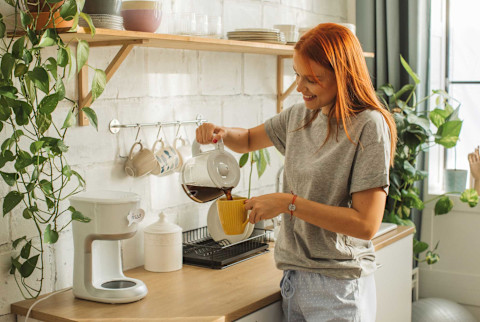The Caffeinated Beverages That Help (& Hurt) Women's Longevity

Caffeine is often viewed as a vice—something consumed in a sugary coffee or demonized as a crutch that some folks need to perk up in the morning. But, caffeine-containing beverages like coffee and tea are actually chock-full of antioxidants, and decades of research show that these drinks are beneficial for heart health and longevity.
Most recently, researchers from Harvard and Tufts University—who just presented this at the American Society For Nutrition conference—investigated the impact of caffeine consumption on aging in women. Findings revealed that one beverage in particular was most linked to better health outcomes. Here’s what you need to know (and what beverage you should be sipping).
About the study
For this study, researchers examined the link between caffeine intake—from coffee, tea, soda, and even decaf coffee—and the likelihood of reaching an older age in good health.
In this context, healthy aging was defined as:
- Living to at least age 70
- No major chronic disease
- No physical limitations (aka good mobility)
- No cognitive concerns or memory complaints
Over 47,000 women were included in this study, and data was collected over 30 years to track these outcomes.
Coffee drinkers were more likely to exhibit healthy aging
On average, women in this group had an average intake of 315 milligrams of caffeine a day. That’s equivalent to about 2.5 to 3 cups of coffee. And coffee accounted for over 80% of caffeine intake.
On average, women in this group had an average intake of 315 milligrams of caffeine a day. That��’s equivalent to about 2.5 to 3 cups of coffee. And coffee accounted for over 80% of caffeine intake.
And the results were clear: Higher midlife caffeine intake—especially from coffee—was associated with a greater likelihood of healthy aging later in life.
What’s interesting is that researchers did not find any links with tea or decaf consumption, and caffeine intake from soda was associated with a significantly lower likelihood of healthy aging.
This relationship holds true even when accounting for other factors that impact the rate of aging like smoking, alcohol use, physical activity, education level, and protein consumption.
“While past studies have linked coffee to individual health outcomes, our study is the first to assess coffee’s impact across multiple domains of aging over three decades,” says study author Dr. Sara Mahdavi, BSc, HBSc, RD, MSc, PhD, in a press release. “The findings suggest that caffeinated coffee—not tea or decaf—may uniquely support aging trajectories that preserve both mental and physical function.”
How to brew a healthy cup of coffee
Drinking around 3 cups of coffee a day (that’s about 24 ounces in total) is the amount that’s consistently linked to better heart health and longevity. So no, you don’t have to feel guilty about sipping on your favorite beverage.
There are just a few ways to make your morning brew more primed to support your health.
The first is to always choose a whole coffee bean blend (preferably of organic Arabica beans) and then grind them yourself before each use. This is the best way to maintain quality, freshness, and antioxidant content of the bean.
Next, opt for a coffee that’s been tested to confirm the presence of beneficial antioxidants and is certified to be free of mold, mycotoxins, and other heavy metals.†
The best coffee that matches this criteria is mindbodygreen’s clean coffee+.
If you’re drinking a lot of coffee, you want it to be as clean as possible (oh, and mindbodygreen’s clean coffee+ meets all these criteria).
Getting the most antioxidants from your coffee
The takeaway
Drinking coffee or other caffeine sources in your 40s or 50s may increase your chances of aging well—meaning not only living longer but maintaining your physical, cognitive, and mental health into your 70s.
Just make sure what’s in your mug isn’t laden with sugar (try adding these anti-inflammatory ingredients instead) and is tested for mold.

